pdf [5.3MB] - Department of Families, Housing, Community Services
pdf [5.3MB] - Department of Families, Housing, Community Services
pdf [5.3MB] - Department of Families, Housing, Community Services
Create successful ePaper yourself
Turn your PDF publications into a flip-book with our unique Google optimized e-Paper software.
Learning disposition and key competencies: The New Zealand and internationalstudies examined found positive impacts <strong>of</strong> ECE participation on learning disposition.Small to medium effect sizes were found for high-quality US intervention studies (e.g. aChicago Child-Parent Centre study found an effect size <strong>of</strong> 0.21 for task orientation andassertive social skills, 0.33 for short term social adjustment in school, 0.34 for socialcompetence). However, it was stated that one study (the Effective Provision <strong>of</strong> Pre-School Education) found evidence <strong>of</strong> fade-out effects by age 7).Antisocial/anxious behaviour: The review had mixed findings on the impact <strong>of</strong> ECEparticipation on antisocial behaviour. US intervention studies found a small reduction(effect size 0.19) <strong>of</strong> ‘acting out’ behaviours’ in the short term. One reviewed studyindicated that non-maternal care including ECE was associated with lower levels <strong>of</strong>physical aggression for children at risk (especially at an early start before 17 months).However, a small number <strong>of</strong> studies <strong>of</strong> low quality ECE programs found that an earlystarting age was associated with higher levels <strong>of</strong> antisocial or worried behaviour at thetime and at school entry.Health outcomes: Most studies reviewed relied on health outcomes reported byparents. Overall, evidence was mixed on outcomes, with some studies indicating moreinfections through ECE participation, while others <strong>of</strong> good quality education indicatinglower cortisol levels in children.The literature review reported that a number <strong>of</strong> positive outcomes were apparent for parentsfrom ECE programs. It was stated that ECE participation can enable parents to learn aboutand implement positive parenting, develop social and community networks, build greaterconfidence and participate in paid employment. This can contribute to an improved homeenvironment as well as improved FF. Particular findings were related to the following areas(Mitchell et al, 2008).Positive parenting: Improved outcomes were found in whanau-led ECE centreswhere parent training and involvement in education were core elements <strong>of</strong> theprogram. Improvements were found in parent-child interactions, father involvement inparenting, parental knowledge <strong>of</strong> child learning and development.Parental life course outcomes: Gains for parents were reported for a number <strong>of</strong>studies in terms <strong>of</strong> developing social networks, community and cultural connections,increasing self esteem, and favourable impacts <strong>of</strong> parental stress and FF.Maternal employment: Studies <strong>of</strong> the relationship between ECE costs and lowincomematernal employment indicated that decreasing ECE costs for low-incomeparents contribute to increased maternal employment as one factor, with therequirement that the decrease in cost be sizeable. Another factor was ECE availabilityin employment decisions. An example <strong>of</strong> evidence is that policy changes in Quebecand Argentina contributing to increased ECE supply and reduced costs were reportedto increase maternal employment.Two studies in particular that were covered by the literature review specifically providedinsight into how ECE participation could support FF. Duncan et al (2005, as cited by Mitchellet al, 2008) studied three ECE centres in low-income New Zealand communities. All centresmet criteria <strong>of</strong> being high quality according to measures and external review. Parentsinvolved in the study identified factors such as finances, work stress, health, family dynamicsand isolation. It was reported that ECE centres were able to support family resilience byenabling families to provide a protective environment, and by <strong>of</strong>fering families access toinformation, social resources, support and encouragement. Love et al (2004, as cited byMitchell et al, 2008) found in their study <strong>of</strong> the US Early Start program, that participation inthe program had favourable impacts on parenting-related stress and negative feelings, andon family conflict. However, these were not found to persist a year later.76


![pdf [5.3MB] - Department of Families, Housing, Community Services](https://img.yumpu.com/43360016/92/500x640/pdf-53mb-department-of-families-housing-community-services.jpg)

![pdf [107kB] - Department of Families, Housing, Community Services](https://img.yumpu.com/51272499/1/190x245/pdf-107kb-department-of-families-housing-community-services.jpg?quality=85)
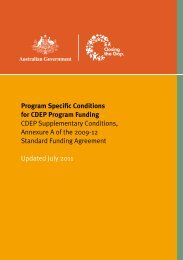

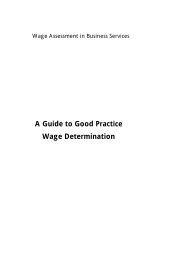

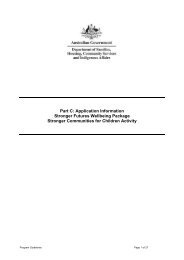
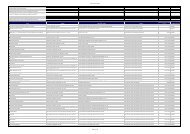
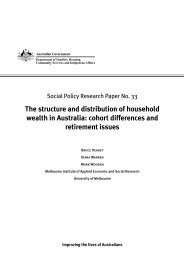



![Land Claim - pdf [278kB] - Department of Families, Housing ...](https://img.yumpu.com/47002639/1/184x260/land-claim-pdf-278kb-department-of-families-housing-.jpg?quality=85)

![Borroloola Land Claim - pdf [299kB] - Department of Families ...](https://img.yumpu.com/46103973/1/184x260/borroloola-land-claim-pdf-299kb-department-of-families-.jpg?quality=85)